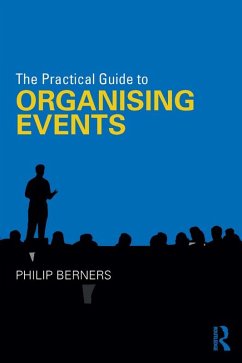Philip Berners
The Practical Guide to Organising Events (eBook, PDF)
42,95 €
42,95 €
inkl. MwSt.
Sofort per Download lieferbar

21 °P sammeln
42,95 €
Als Download kaufen

42,95 €
inkl. MwSt.
Sofort per Download lieferbar

21 °P sammeln
Jetzt verschenken
Alle Infos zum eBook verschenken
42,95 €
inkl. MwSt.
Sofort per Download lieferbar
Alle Infos zum eBook verschenken

21 °P sammeln
Philip Berners
The Practical Guide to Organising Events (eBook, PDF)
- Format: PDF
- Merkliste
- Auf die Merkliste
- Bewerten Bewerten
- Teilen
- Produkt teilen
- Produkterinnerung
- Produkterinnerung

Bitte loggen Sie sich zunächst in Ihr Kundenkonto ein oder registrieren Sie sich bei
bücher.de, um das eBook-Abo tolino select nutzen zu können.
Hier können Sie sich einloggen
Hier können Sie sich einloggen
Sie sind bereits eingeloggt. Klicken Sie auf 2. tolino select Abo, um fortzufahren.

Bitte loggen Sie sich zunächst in Ihr Kundenkonto ein oder registrieren Sie sich bei bücher.de, um das eBook-Abo tolino select nutzen zu können.
The Practical Guide to Organising Events is a short, accessible and practical guide on how to successfully plan and organise a variety of event types in a wide range of contexts. Topics covered include proposal writing, budget, funding and sponsorship, health and safety, security and evaluation. Written with reality and experience, using real-life case studies and anecdotal examples, The Practical Guide to Organising Events ultimately makes the business of events management appealing, understandable and achievable.
- Geräte: PC
- mit Kopierschutz
- eBook Hilfe
- Größe: 1.47MB
Andere Kunden interessierten sich auch für
![Events and the Environment (eBook, PDF) Events and the Environment (eBook, PDF)]() Robert CaseEvents and the Environment (eBook, PDF)48,95 €
Robert CaseEvents and the Environment (eBook, PDF)48,95 €![The Value of Events (eBook, PDF) The Value of Events (eBook, PDF)]() The Value of Events (eBook, PDF)42,95 €
The Value of Events (eBook, PDF)42,95 €![Marketing Research for the Tourism, Hospitality and Events Industries (eBook, PDF) Marketing Research for the Tourism, Hospitality and Events Industries (eBook, PDF)]() Bonita KolbMarketing Research for the Tourism, Hospitality and Events Industries (eBook, PDF)49,95 €
Bonita KolbMarketing Research for the Tourism, Hospitality and Events Industries (eBook, PDF)49,95 €![The Tourism, Hospitality and Events Student's Guide to Study and Employability (eBook, PDF) The Tourism, Hospitality and Events Student's Guide to Study and Employability (eBook, PDF)]() Sally EverettThe Tourism, Hospitality and Events Student's Guide to Study and Employability (eBook, PDF)40,95 €
Sally EverettThe Tourism, Hospitality and Events Student's Guide to Study and Employability (eBook, PDF)40,95 €![Major Reward and Recognition Events (eBook, PDF) Major Reward and Recognition Events (eBook, PDF)]() Lukasz SwiatekMajor Reward and Recognition Events (eBook, PDF)41,95 €
Lukasz SwiatekMajor Reward and Recognition Events (eBook, PDF)41,95 €![Events and Society (eBook, PDF) Events and Society (eBook, PDF)]() Events and Society (eBook, PDF)41,95 €
Events and Society (eBook, PDF)41,95 €![Working with Venues for Events (eBook, PDF) Working with Venues for Events (eBook, PDF)]() Emma DelaneyWorking with Venues for Events (eBook, PDF)42,95 €
Emma DelaneyWorking with Venues for Events (eBook, PDF)42,95 €-
-
-
The Practical Guide to Organising Events is a short, accessible and practical guide on how to successfully plan and organise a variety of event types in a wide range of contexts. Topics covered include proposal writing, budget, funding and sponsorship, health and safety, security and evaluation. Written with reality and experience, using real-life case studies and anecdotal examples, The Practical Guide to Organising Events ultimately makes the business of events management appealing, understandable and achievable.
Dieser Download kann aus rechtlichen Gründen nur mit Rechnungsadresse in A, B, BG, CY, CZ, D, DK, EW, E, FIN, F, GR, HR, H, IRL, I, LT, L, LR, M, NL, PL, P, R, S, SLO, SK ausgeliefert werden.
Produktdetails
- Produktdetails
- Verlag: Taylor & Francis eBooks
- Seitenzahl: 228
- Erscheinungstermin: 14. Juli 2017
- Englisch
- ISBN-13: 9781351819183
- Artikelnr.: 48792737
- Verlag: Taylor & Francis eBooks
- Seitenzahl: 228
- Erscheinungstermin: 14. Juli 2017
- Englisch
- ISBN-13: 9781351819183
- Artikelnr.: 48792737
- Herstellerkennzeichnung Die Herstellerinformationen sind derzeit nicht verfügbar.
Philip Berners graduated with a degree in hospitality management from the University of West London where he later returned as a lecturer in events management. He is presently teaching events management and researching for his doctorate on the development of the events industry in a post-communist society: a case study of Poland.
Philip spent ten years in Poland as an events consultant and founded an events training school in Warsaw. He also taught event management for Collegium Civitas University at the Palace of Culture and Science.
Philip has organised every genre of event in the UK, Italy, Portugal and Poland; he was venue manager at the London Hippodrome, Camden Palace and Thorpe Park; and he has been the in-house event manager for corporations including the Daily Mail Group. His client portfolio includes the Queen, Prince Charles, Bon Jovi, Shania Twain, Jennifer Lopez, The BRIT Awards, MOBO Awards, The Publican newspaper, London Fashion Week, the British Red Cross, Xerox, Virgin Atlantic, British Airways, Formula 1, Panasonic, Max Power magazine, PC Zone magazine, Alternative Hair Show, Kent Institute of Art and Design, Schweppes and Diageo.
Philip's qualifications are as follows: Bachelor of Arts Degree in Hospitality Management; City and Guilds in Hotel, Catering and Institutional Management; Postgraduate Certificate in Academic Practice; Fellowship of the Higher Education Academy; and he is about to commence his PhD.
Philip spent ten years in Poland as an events consultant and founded an events training school in Warsaw. He also taught event management for Collegium Civitas University at the Palace of Culture and Science.
Philip has organised every genre of event in the UK, Italy, Portugal and Poland; he was venue manager at the London Hippodrome, Camden Palace and Thorpe Park; and he has been the in-house event manager for corporations including the Daily Mail Group. His client portfolio includes the Queen, Prince Charles, Bon Jovi, Shania Twain, Jennifer Lopez, The BRIT Awards, MOBO Awards, The Publican newspaper, London Fashion Week, the British Red Cross, Xerox, Virgin Atlantic, British Airways, Formula 1, Panasonic, Max Power magazine, PC Zone magazine, Alternative Hair Show, Kent Institute of Art and Design, Schweppes and Diageo.
Philip's qualifications are as follows: Bachelor of Arts Degree in Hospitality Management; City and Guilds in Hotel, Catering and Institutional Management; Postgraduate Certificate in Academic Practice; Fellowship of the Higher Education Academy; and he is about to commence his PhD.
List of contributors
Preface
Acknowledgements
PART 1
Introduction
1 The culture of events
1.1 Developed markets
1.2 Undeveloped and developing markets
1.3 Sustainable events
2 The structure of events
2.1 Types of event
2.2 Sectors of the event industry
2.3 The structure of an event
3 The role of the event organiser
3.1 Types of event organiser
3.2 The 'real' event manager
3.3 The 'real' client
3.4 Risk and control
3.5 Staffing
PART 2
Management pre-event
4 The enquiry to confirmation stage
4.1 Enquiry
4.2 Brief
4.3 Proposal
4.4 Budget proposal
4.5 Confirmation
5 Management of the lead-in
5.1 Lead-in
5.2 The venue
5.3 Marketing
5.4 Funding
5.5 Theme
5.6 The client file
6 Catering and beverages
6.1 Catering
6.2 Beverages
7 Client liaison and communications
7.1 Tickets and invitations
7.2 Client liaison
7.3 Event checklist
7.4 Administration checklist
7.5 Production companies
PART 3
Management on-site: operational event management
8 Event organiser responsibilities
8.1 Checking
8.2 Hosting
8.3 The running order
8.4 Sequence
8.5 Production office
8.6 Rehearsal
8.7 Caterers
8.8 Theme and decoration
8.9 Entertainment riders
8.10 Staff briefing
8.11 Pre-event briefing
8.12 On-site briefing
8.13 Security
8.14 Final walk-round
8.15 Fire, health and safety
8.16 Aesthetics
8.17 The front door
8.18 Cloakroom
9 Inside the event
9.1 The guest experience
9.2 The press
9.3 Event photography
9.4 De-rig
9.5 Get-out
PART 4
Management post-event
10 Debriefs and reports
10.1 Debriefs
10.2 Complaint handling
10.3 Guest feedback
10.4 Final report
11 Case studies
Case study 1 by Philip Berners: Garden party hosted by Queen Elizabeth II,
Windsor
Case study 2 by Philip Berners: Artist and VIP hospitality at The BRIT
Awards
Case study 3 by Philip Berners: Worldwide launch of the Bon Jovi album,
Crush
Case study 4 by Chantal Dickson: The 2014 Tour de France Grand Départ Leeds
Case study 5 by Paul Glover: A circus celebration event in London
Case study 6 by Ariane Lengyel: Grand party at the Palace of Versailles
Case study 7 by Amira Malek: Reflections on graduating with an events
management degree
Case study 8 by Dr Evangelia Marinakou: An international IT conference in
Greece
Case study 9 by David Titley: Reflections of studying for a degree in
events management
12 Event management as a career choice
13 The author's career path
13.1 Author's eventography
Appendices
I Event enquiry form
II Example sponsor package
III Event checklist
IV Administration checklist
V Example function sheet (running order)
VI Final report
Glossary of technical terms
Index
Preface
Acknowledgements
PART 1
Introduction
1 The culture of events
1.1 Developed markets
1.2 Undeveloped and developing markets
1.3 Sustainable events
2 The structure of events
2.1 Types of event
2.2 Sectors of the event industry
2.3 The structure of an event
3 The role of the event organiser
3.1 Types of event organiser
3.2 The 'real' event manager
3.3 The 'real' client
3.4 Risk and control
3.5 Staffing
PART 2
Management pre-event
4 The enquiry to confirmation stage
4.1 Enquiry
4.2 Brief
4.3 Proposal
4.4 Budget proposal
4.5 Confirmation
5 Management of the lead-in
5.1 Lead-in
5.2 The venue
5.3 Marketing
5.4 Funding
5.5 Theme
5.6 The client file
6 Catering and beverages
6.1 Catering
6.2 Beverages
7 Client liaison and communications
7.1 Tickets and invitations
7.2 Client liaison
7.3 Event checklist
7.4 Administration checklist
7.5 Production companies
PART 3
Management on-site: operational event management
8 Event organiser responsibilities
8.1 Checking
8.2 Hosting
8.3 The running order
8.4 Sequence
8.5 Production office
8.6 Rehearsal
8.7 Caterers
8.8 Theme and decoration
8.9 Entertainment riders
8.10 Staff briefing
8.11 Pre-event briefing
8.12 On-site briefing
8.13 Security
8.14 Final walk-round
8.15 Fire, health and safety
8.16 Aesthetics
8.17 The front door
8.18 Cloakroom
9 Inside the event
9.1 The guest experience
9.2 The press
9.3 Event photography
9.4 De-rig
9.5 Get-out
PART 4
Management post-event
10 Debriefs and reports
10.1 Debriefs
10.2 Complaint handling
10.3 Guest feedback
10.4 Final report
11 Case studies
Case study 1 by Philip Berners: Garden party hosted by Queen Elizabeth II,
Windsor
Case study 2 by Philip Berners: Artist and VIP hospitality at The BRIT
Awards
Case study 3 by Philip Berners: Worldwide launch of the Bon Jovi album,
Crush
Case study 4 by Chantal Dickson: The 2014 Tour de France Grand Départ Leeds
Case study 5 by Paul Glover: A circus celebration event in London
Case study 6 by Ariane Lengyel: Grand party at the Palace of Versailles
Case study 7 by Amira Malek: Reflections on graduating with an events
management degree
Case study 8 by Dr Evangelia Marinakou: An international IT conference in
Greece
Case study 9 by David Titley: Reflections of studying for a degree in
events management
12 Event management as a career choice
13 The author's career path
13.1 Author's eventography
Appendices
I Event enquiry form
II Example sponsor package
III Event checklist
IV Administration checklist
V Example function sheet (running order)
VI Final report
Glossary of technical terms
Index
List of contributors
Preface
Acknowledgements
PART 1
Introduction
1 The culture of events
1.1 Developed markets
1.2 Undeveloped and developing markets
1.3 Sustainable events
2 The structure of events
2.1 Types of event
2.2 Sectors of the event industry
2.3 The structure of an event
3 The role of the event organiser
3.1 Types of event organiser
3.2 The 'real' event manager
3.3 The 'real' client
3.4 Risk and control
3.5 Staffing
PART 2
Management pre-event
4 The enquiry to confirmation stage
4.1 Enquiry
4.2 Brief
4.3 Proposal
4.4 Budget proposal
4.5 Confirmation
5 Management of the lead-in
5.1 Lead-in
5.2 The venue
5.3 Marketing
5.4 Funding
5.5 Theme
5.6 The client file
6 Catering and beverages
6.1 Catering
6.2 Beverages
7 Client liaison and communications
7.1 Tickets and invitations
7.2 Client liaison
7.3 Event checklist
7.4 Administration checklist
7.5 Production companies
PART 3
Management on-site: operational event management
8 Event organiser responsibilities
8.1 Checking
8.2 Hosting
8.3 The running order
8.4 Sequence
8.5 Production office
8.6 Rehearsal
8.7 Caterers
8.8 Theme and decoration
8.9 Entertainment riders
8.10 Staff briefing
8.11 Pre-event briefing
8.12 On-site briefing
8.13 Security
8.14 Final walk-round
8.15 Fire, health and safety
8.16 Aesthetics
8.17 The front door
8.18 Cloakroom
9 Inside the event
9.1 The guest experience
9.2 The press
9.3 Event photography
9.4 De-rig
9.5 Get-out
PART 4
Management post-event
10 Debriefs and reports
10.1 Debriefs
10.2 Complaint handling
10.3 Guest feedback
10.4 Final report
11 Case studies
Case study 1 by Philip Berners: Garden party hosted by Queen Elizabeth II,
Windsor
Case study 2 by Philip Berners: Artist and VIP hospitality at The BRIT
Awards
Case study 3 by Philip Berners: Worldwide launch of the Bon Jovi album,
Crush
Case study 4 by Chantal Dickson: The 2014 Tour de France Grand Départ Leeds
Case study 5 by Paul Glover: A circus celebration event in London
Case study 6 by Ariane Lengyel: Grand party at the Palace of Versailles
Case study 7 by Amira Malek: Reflections on graduating with an events
management degree
Case study 8 by Dr Evangelia Marinakou: An international IT conference in
Greece
Case study 9 by David Titley: Reflections of studying for a degree in
events management
12 Event management as a career choice
13 The author's career path
13.1 Author's eventography
Appendices
I Event enquiry form
II Example sponsor package
III Event checklist
IV Administration checklist
V Example function sheet (running order)
VI Final report
Glossary of technical terms
Index
Preface
Acknowledgements
PART 1
Introduction
1 The culture of events
1.1 Developed markets
1.2 Undeveloped and developing markets
1.3 Sustainable events
2 The structure of events
2.1 Types of event
2.2 Sectors of the event industry
2.3 The structure of an event
3 The role of the event organiser
3.1 Types of event organiser
3.2 The 'real' event manager
3.3 The 'real' client
3.4 Risk and control
3.5 Staffing
PART 2
Management pre-event
4 The enquiry to confirmation stage
4.1 Enquiry
4.2 Brief
4.3 Proposal
4.4 Budget proposal
4.5 Confirmation
5 Management of the lead-in
5.1 Lead-in
5.2 The venue
5.3 Marketing
5.4 Funding
5.5 Theme
5.6 The client file
6 Catering and beverages
6.1 Catering
6.2 Beverages
7 Client liaison and communications
7.1 Tickets and invitations
7.2 Client liaison
7.3 Event checklist
7.4 Administration checklist
7.5 Production companies
PART 3
Management on-site: operational event management
8 Event organiser responsibilities
8.1 Checking
8.2 Hosting
8.3 The running order
8.4 Sequence
8.5 Production office
8.6 Rehearsal
8.7 Caterers
8.8 Theme and decoration
8.9 Entertainment riders
8.10 Staff briefing
8.11 Pre-event briefing
8.12 On-site briefing
8.13 Security
8.14 Final walk-round
8.15 Fire, health and safety
8.16 Aesthetics
8.17 The front door
8.18 Cloakroom
9 Inside the event
9.1 The guest experience
9.2 The press
9.3 Event photography
9.4 De-rig
9.5 Get-out
PART 4
Management post-event
10 Debriefs and reports
10.1 Debriefs
10.2 Complaint handling
10.3 Guest feedback
10.4 Final report
11 Case studies
Case study 1 by Philip Berners: Garden party hosted by Queen Elizabeth II,
Windsor
Case study 2 by Philip Berners: Artist and VIP hospitality at The BRIT
Awards
Case study 3 by Philip Berners: Worldwide launch of the Bon Jovi album,
Crush
Case study 4 by Chantal Dickson: The 2014 Tour de France Grand Départ Leeds
Case study 5 by Paul Glover: A circus celebration event in London
Case study 6 by Ariane Lengyel: Grand party at the Palace of Versailles
Case study 7 by Amira Malek: Reflections on graduating with an events
management degree
Case study 8 by Dr Evangelia Marinakou: An international IT conference in
Greece
Case study 9 by David Titley: Reflections of studying for a degree in
events management
12 Event management as a career choice
13 The author's career path
13.1 Author's eventography
Appendices
I Event enquiry form
II Example sponsor package
III Event checklist
IV Administration checklist
V Example function sheet (running order)
VI Final report
Glossary of technical terms
Index







